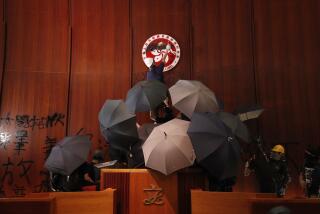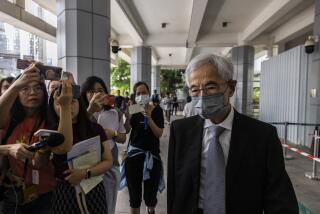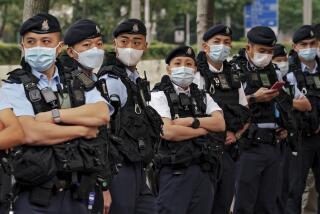Hong Kong protest leader announces hunger strike
- Share via
Reporting from Hong Kong — A student leader of Hong Kong’s pro-democracy protests said Monday that he and two other students were launching a hunger strike, a new tactic in the movement, which has begun to sputter after more than two months of sit-ins.
The announcement from Joshua Wong came after the protests ebbed and flowed Sunday as police dispersed demonstrators from a roadway in front of Hong Kong’s government headquarters, only to see them return later in the night.
Police armed with batons and pepper spray beat back avowedly nonviolent protesters defending themselves with umbrellas and cardboard shields.
The siege began with protesters mobilizing to surround all major entrances to the government office compound.
About 2,000 protesters spread out across a six-lane highway across from the entrance to the office of the territory’s chief executive, a key figure in the demonstrations. But the line of demonstrators crumbled as riot police advanced, leaving a tableau of mangled umbrellas and dropped helmets.
“Police, stop using violence. Police destroy the rule of law,” protesters chanted after being chased to a nearby harbor-front promenade and then scattered from there.
Later, however, they returned and reclaimed the highway — only to be beat back again.
“I was very frightened, but I stood my ground as best I could,” said Karson Ngan, a college senior who was on the front line. His finger joints were swollen from blows from the police batons. “This is our last-ditch battle.”
Forty protesters were arrested, police Senior Supt. Tsui Wai-hung told the Associated Press.
The movement in Hong Kong, begun in late September, has become the longest pro-democracy campaign on Chinese soil. The former British colony reverted to Chinese rule 17 years ago under the Sino-British Joint Declaration, ensuring a certain level of autonomy for Hong Kongers. The demonstrations erupted when Beijing published restrictive guidelines for the 2017 election for chief executive.
The demonstrators say the framework would not allow for the free nomination of candidates.
After drawing massive crowds to the streets in late September and early October, the protests have diminished substantially, although a few thousand demonstrators remain encamped in the Admiralty and Causeway Bay neighborhoods. Holdouts in the Mong Kok area were forcibly removed last week.
After more than two months of occupying thoroughfares failed to elicit a response from the government, student leaders have come under pressure to escalate, especially from those who were ousted from Mong Kok, many of whom have long objected to being represented by student groups.
As fissures within the pro-democracy movement have become more pronounced, some protesters have begun to express doubts.
Recent college graduate Alan Leung said that although he shares the sentiments of those who want the movement to be leaderless, the lack of a persuasive leader may have hurt it.
“Perhaps that’s why this movement is splitting up,” Leung said. “Now, I’m starting to wonder if our movement is supported by the people.”
One early supporter, Ivy Ng, 42, said she noticed that some of her fellow protesters were missing Sunday.
“I feel conflicted,” Ng said. “To fight on doesn’t seem very hopeful but to retreat will mean even less hope.”
Law is a special correspondent. Times staff writer Kurtis Lee in Los Angeles contributed to this report.
More to Read
Sign up for Essential California
The most important California stories and recommendations in your inbox every morning.
You may occasionally receive promotional content from the Los Angeles Times.













